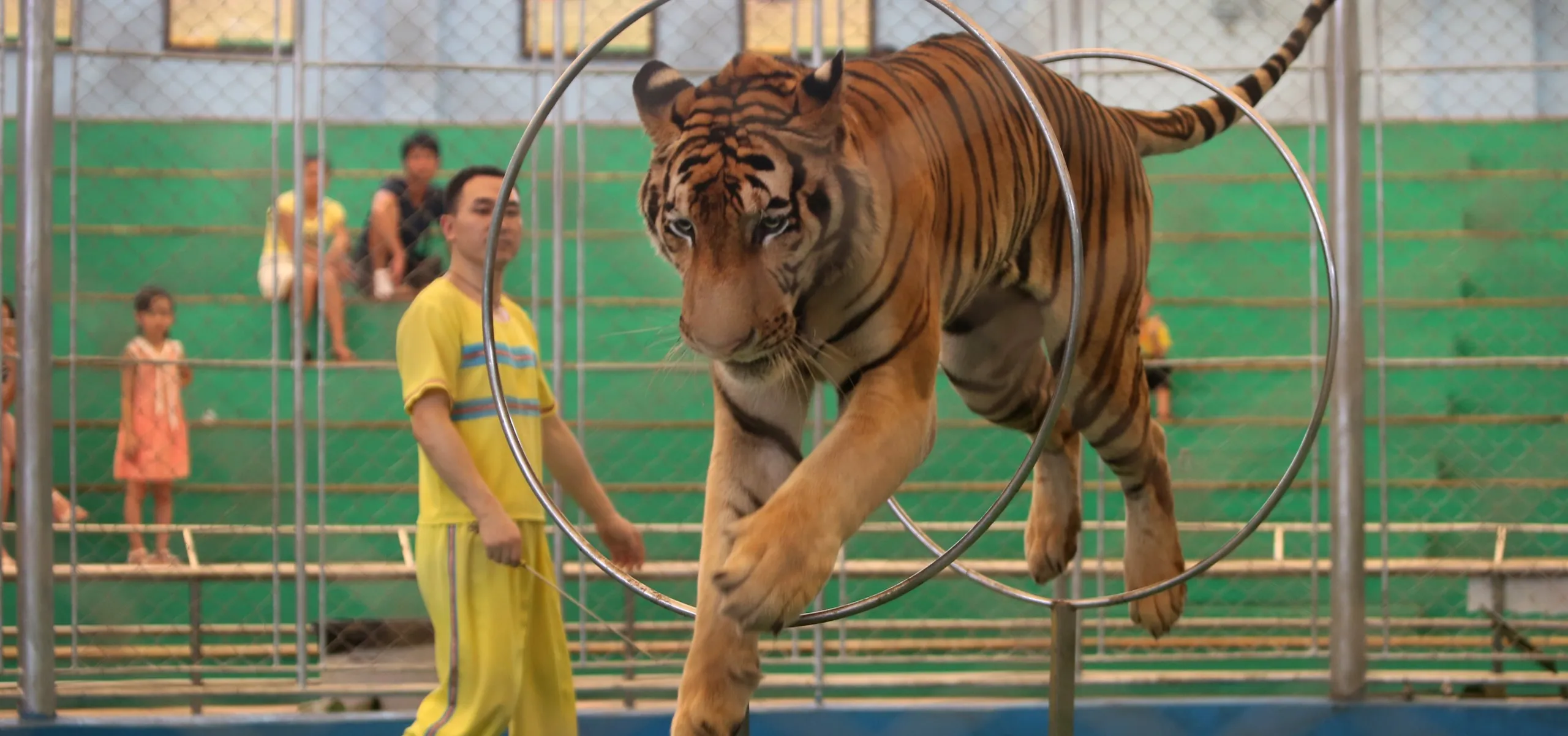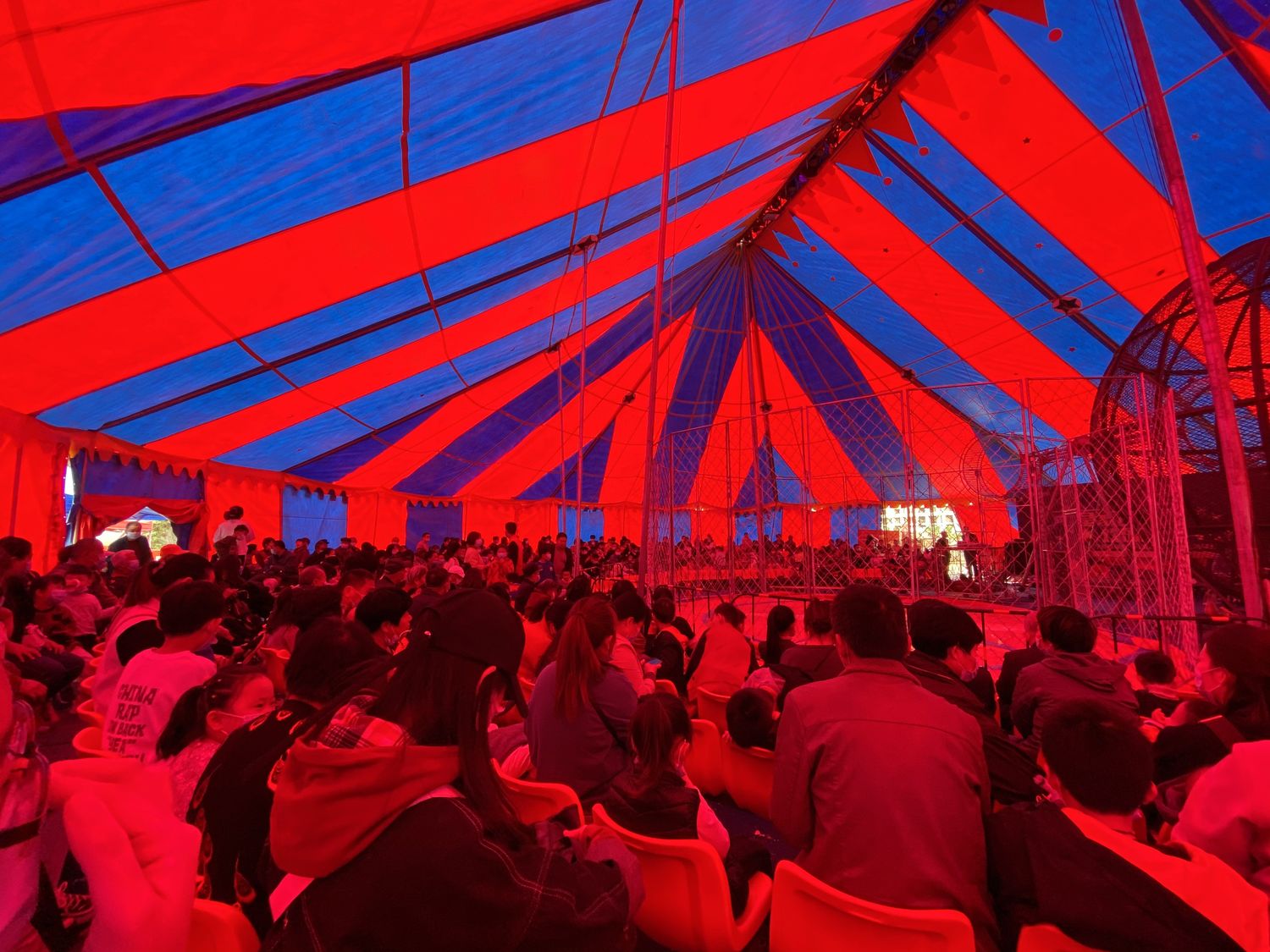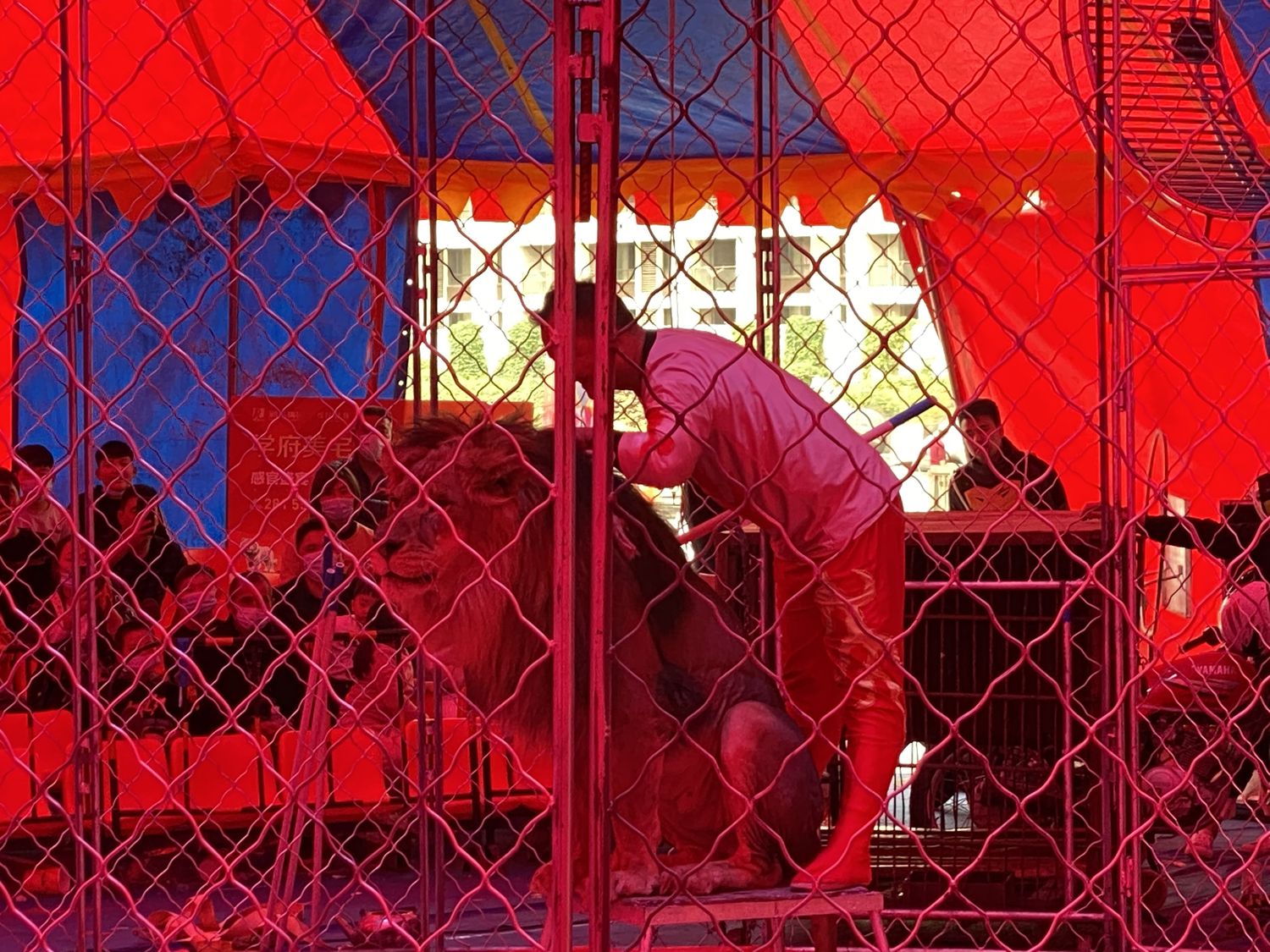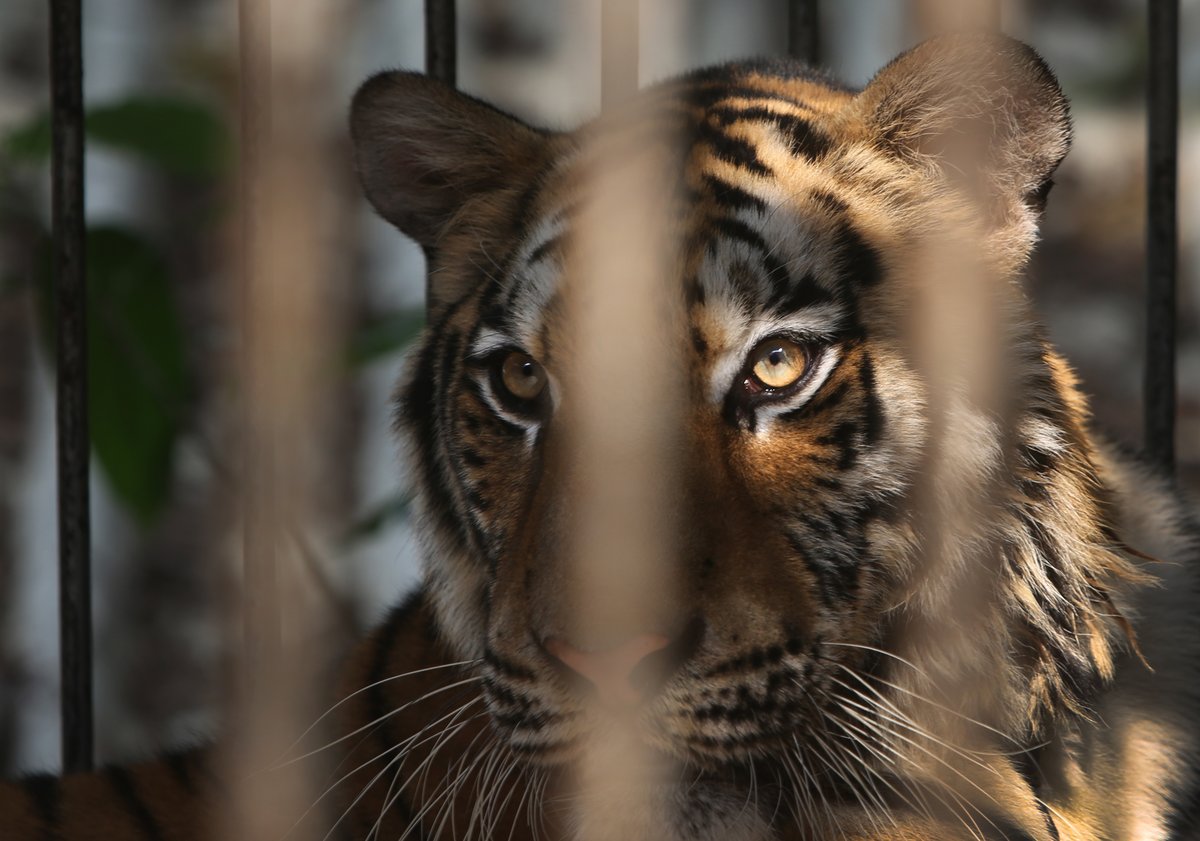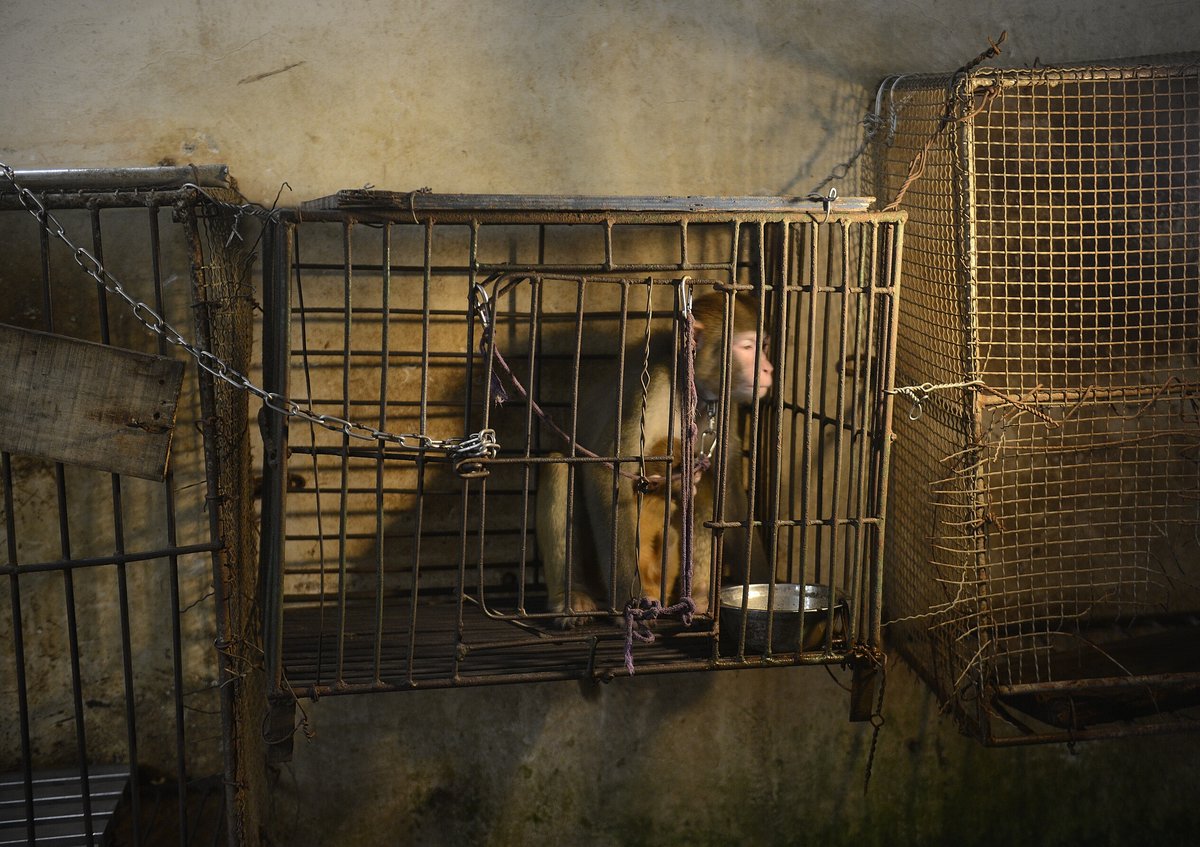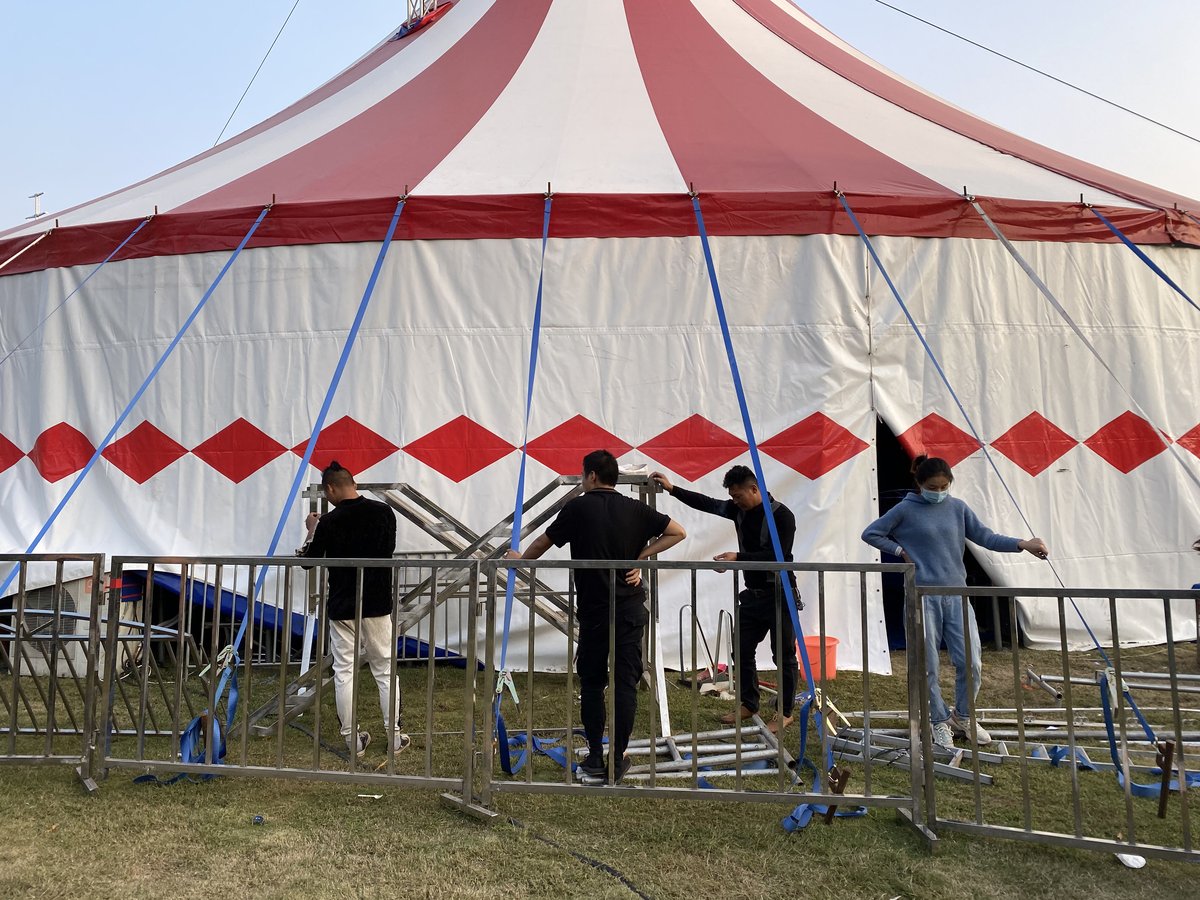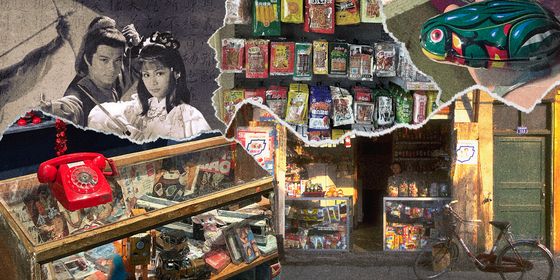One woman’s battle against illegal animal performances in China
-1-
The apartment circus
The year was 2020, and we were in a small town in Shangqiu, Henan.
The new apartment complex across from the city hall had just put up a large tent with red and blue stripes. It was the last day of the National Day holiday, and the tent was packed with over 100 children and adults. They were waiting to see a free circus show.
Inside the tent, a four-meter-tall chain-link fence separated the audience from a small performance space. Various props were arranged around the stage.
Accompanied by rousing music, a well-built trainer walked out with a black bear the height of his shoulders. He led the bear once around the fence, gesturing for everyone to see.
The trainer then led the bear in climbing gymnastic bars and jumping rope. The children on the sidelines oohed and aahed. The adults, by contrast, looked disengaged. It may be because this hidden circus had been running three times a day during the National Day holiday. It was now the seventh day. Who knows how many of the adults present were seeing the show for the umpteenth time?
Although animals headlined the show, there were more human acrobats performing. After several dazzling acts, it was time for the main event.
The cheers from the crowd could only mean one thing—an apex predator.
Two animal trainers came onstage with a slow-moving tiger.
Unlike the previous black bear performance, both trainers held white target sticks in their hands. They directed the tiger to climb up and down and perform simple movements for the audience. But this tiger seemed dull and lifeless.
And it wasn’t only the tiger: Next up was a lion, which slowly performed the actions indicated by the trainers. The scene created a stark contrast to the announcer’s dramatic commentary: Native to the savannas of Africa, the lion is powerfully built and lightning-fast, as swift as a leopard cat.
There was a minor incident at this juncture. The trainers wanted the lion to lie down and roll over, but it just lay there, unwilling to move.
The trainer tapped the target stick near the lion a few times, but received no response. So he took out a whip and cracked it on the ground a few times. Only then did the lion finally roll over.
The lion was the least cooperative of the animals that had appeared so far. After it got up, it was supposed to pose on the stool next to the trainer, but it began a slow patrol along the chain-link fence instead. No matter how the trainer guided it with the stick or stroked it with his hands, it wouldn’t come back.
The crowd fell silent. The primordial tension between man and beast seemed to reach through the wire, reminding everyone present of the animal attacks that keep appearing in the news.
Fortunately, nothing happened this time. The lion returned to performance mode, going through a few passable movements with its trainer before leaving the stage.
It was the seventh day of the show; perhaps the fatigue had gotten to them. The show, which had already been 40 minutes late in starting, now ended early as well. As the crowd dispersed, the show’s sponsor didn’t forget to advertise: After the conclusion of this amazing performance, please consult our sales staff if you are in the market for a home.
It’s likely that most of the audience didn’t hear or care about the advertisement. However, they were curious to know why a perfectly good performance would start late and end early. Why did the animal show seem to be missing some spark? What could have gone wrong?
They didn’t know the answer, but we did.
This circus show had been reported by a woman named Hu Chunmei. She runs a non-profit organization called Save the Performing Animals (拯救表演动物). She had been in the audience the whole time, recording every detail about these animals.
-2-
The elephant in the concrete box
Chunmei: My name is Hu Chunmei, and I’m a millennial. I currently work as an animal welfare advocate, with the goal of ending animal performances.
I was always an obedient student. In university, I followed my professors’ advice and majored in water conservation, which has nothing to do with animals.
In 2011, I learned by chance that a few students at my university had used their winter vacation to investigate animal welfare at a zoo in their hometown. I went to a presentation of their findings. I subsequently started volunteering with a wildlife monitoring group.
In 2012, the year after I joined the group, there was the African Elephant Incident.
Shanxi’s Taiyuan Zoo and Xinjiang’s Tianshan Zoo had each introduced two African elephants that year. Three of those four elephants died right away.
It was winter when I went to Taiyuan, and it was snowing. When I arrived at the zoo, I saw a baby elephant that had been shipped from Africa to that frigid place. It was in terrible condition and very thin. Its habitat was just concrete walls on three sides; the fourth side had a fence and a glass window. The ground was totally bare.
It kept circling its exhibit. When it got to the side with a staff entrance, a steel door covered in wooden planks, it would use its trunk to rip the wood into small pieces. It kept curling its trunk and tossing these pieces onto its back—restless and strange behavior.
Although African elephants face poaching and other threats in their native environment, are we giving them a better life by capturing them and keeping them in zoos? In my view, we aren’t.
Aside from monitoring the animals’ conditions, I encountered many inappropriate animal performances when I visited zoos around the country.
Back then, the Chimelong Safari Park in Guangzhou still had white tiger shows. They were proud to have nearly half of the white tigers in the world.
White tigers are albino Bengal tigers. They are product of inbreeding, with no ability to survive in the wild. Many of them have inherited genetic disorders. The zoo had a signature show: The white tigers would bite the end of a rope and play tug-of-war with visitors to see who was stronger.
Without training, the tigers could yank the rope away with just one tug. The trainers had to teach them to bite the rope without letting go. But people also exerted significant force when they pulled on the rope, which could hurt the tigers’ teeth or bodies.
Chimelong has stopped holding these shows, but they still take place at other zoos.
There are many similar acts with land animals like tigers, chimpanzees, bears, and macaques, as well as aquatic animals like dolphins and seals. They are dressed up like people and taught to imitate human behavior in order to win over the audience.
Zoos hold these shows for their mass appeal, though I learned through my investigation that there may also be business considerations at play.
Behind the scenes, private circuses are running these shows. They partner with zoos by attracting investment, securing themselves a stable performance venue. Some of the performance arenas are even built by the circuses themselves. These for-profit shows are sites of rampant animal abuse.
-3-
The circus animals
When we observe animal shows, we focus on several points.
For example, when I go to a tiger or lion show, I look to see whether the animals are skinny or fat, whether there is any lameness, and whether their tail is intact. Some animals lose part of their tail to frostbite, while others perform even with a lame leg.
I also pay attention to the tigers’ and lions’ teeth. Someone in the industry once told me that a single tiger tooth can sell for up to 20,000 yuan, so many of the tigers’ teeth will have been sawed off. Circuses will also saw off tigers’ teeth when they are young for safety reasons.
During shows, all of the animals walk onstage like people. All of the bears walk out on their hind legs.
Black bears are used to walking on all fours; they stand upright for short periods when they have a motive. But during shows, the bears are forced to stand throughout. Whenever they try to drop to all fours, they are pulled back up.
When some bears return to their cages, they violently shake their cages or bite the bars; so sometimes, their teeth are not sawed off by humans, but worn down by their own struggles.
No captive animal’s life can compare with the lives of animals in the wild. But circus animals may be the worst-off of all animals in captivity.
Circus animals spend their whole lives in cages, coming out only for performances. They make profit for the circus operators, but these profits are never used toward benefiting the animals, only bringing them more harm.
I thought I ought to do something for these performing animals.
In July of 2013, the Ministry of Housing and Urban-Rural Development launched the National Zoo Development Roadmap, which clearly stated that zoos were to end all animal performances.
Zoos around the country started ending their contracts with circuses. With the loss of their venues, these circuses had no choice but to look elsewhere.
Meanwhile, starting in 2010, China’s real estate industry had taken off. Similar to seeking celebrity endorsements, real estate developers were looking for an affordable and popular way to bring in customers.
In this way, circuses found a new home. Even well-known developers in major urban centers have been known to host animal shows.
I once saw an ad for a sea lion show at a mall in the Qinghe neighborhood of Beijing. We figured we would talk to the mall before we reported them—they might call off the performance.
We talked face-to-face for three hours without making any headway. We simply couldn’t see eye-to-eye on the issue.
I had to watch helplessly as the sea lion arrived. As the pool filled up, the water got dirtier and dirtier. The sea lion seemed to be itchy, and kept scratching itself. I got itchy just watching, but nobody came to change the water. When it wasn’t performing, the sea lion was kept in a small cage, its movement restricted. The less it moved, the less inconvenience it would cause for its keepers.
We had no choice but to report the show. At the time, there didn’t seem to be a better alternative.
After making the report, I found out that the show was illegal. I never expected that such a large mall would participate in an illegal activity.
-4-
The letter of the law
Story FM: We would like to clarify that the purpose of this episode is not to debate whether animal shows should exist, but rather to prevent illegal performances under the current regulatory framework. These shows are only one form of illegal use of wild animals: They can be affected by illegal activities at any point in their life cycles, suffering not only from captive breeding but also threats in the wild and to their natural habitats.
According to the third revision of the Wildlife Protection Law in 2018, China has not yet completely banned animal performances. But legal animal performances must follow a complex bureaucratic process and receive approval from many departments.
For example, Article 26 of the law states that “wild animals cannot be abused,” while Article 27 states that “shows must be approved by the provincial forestry bureau.” When the performances include protected species like tigers, lions, bears, and macaques, they especially need review by the national or provincial forestry bureau.
Article 33 states, “The transportation of performing animals to a venue requires local permits and quarantine certificates.” A circus director once called this “the most difficult documentation” to acquire.
It takes a high level of organization to clear administrative hurdles across multiple departments. But the circuses wouldn’t want to spend time waiting for these permits when they could be traveling to their next show and making profits, so they end up illegally sharing or falsifying permits.
When we look at the circuses that show up in the news, the overwhelming majority are operating outside the law. So while Chunmei is motivated by her love of animals and concern for their welfare, she also wants to regulate the market for animal performances and find a new way for humans to enjoy their presence.
Before social media took off, Chunmei made about one trip per month. Each time, she would visit several zoos, property developments, and malls undercover.
But ever since she took charge of the Save the Performing Animals organization, she has been able to use social media to determine the precise locations and details of animal shows and contact the relevant authorities in advance.
For example, the Shangqiu circus performance we heard about in the introduction was one of about 100 that Chunmei recorded during the National Day and Mid-Autumn Festival holidays in the fall of 2020.
-5-
Enforcement challenges
That particular performance started late because Chunmei had contacted the forest police and asked them to check the circus’s credentials. But to her surprise, the police did not stop the performance.
So as soon as the show was over, Chunmei called to ask what was going on.
Chunmei: Hello there, I’m the person who reported the illegal animal performance this morning.
Forest police: We’ve already gone over there. They have both their quarantine certificate and their captive breeding license.
Chunmei: The breeding license only allows them to raise the animals, not to have them perform.
Forest police: We’ve always done it this way. I don’t know which department would be responsible for regulating the performances.
Chunmei: Animal performances are considered a commercial activity, so they require a business license.
Forest police: It depends on where they submitted their application. We don’t know if they’ve applied with us.
Chunmei: If they haven’t gotten approval, can they still hold animal shows?
In order to raise wild animals, you need a captive breeding license. Quarantine measures have gotten stricter due to the pandemic. The authorities used to not even check the quarantine certificate.
Even though the shows were free to attend, the circus must have a contract with the property developer. This makes it a commercial activity, so they should have applied for a business license under Article 27 of the Wildlife Protection Law.
Based on the information provided by the forest police, the circus does not have this license, so the performance had some fundamental legal issues.
The show also included tigers, which fall under the authority of the National Forestry and Grassland Administration. According to a document from 2017, there is a moratorium on tiger permits. So if a circus includes tigers, then it is by definition illegal.
Chunmei then contacted the Henan Provincial Forestry Bureau.
Provincial Bureau: Which documents are you saying they don’t have?
Chunmei: They don’t have a business license, only their captive breeding license and quarantine certificate.
Provincial Bureau: I’m just the employee on call, so I’ll need a professional opinion. We’ll leave a message and let the relevant division handle it.
Chunmei: They performed this morning, and will have two more shows this afternoon at 3 p.m. and in the evening. I’m hoping someone can come over to investigate this afternoon.
Provincial Bureau: It’s real estate people that are holding the shows, is that right?
Chunmei: There’s a lion, a bear, a macaque, and a monkey, and the tiger’s teeth seem to have been sawed off.
Provincial Bureau: Alright, alright, thank you.
Even with robust regulations in place, you still come up against complicated and frustrating realities when you try to ban animal performances.
This is because wildlife protection involves the Forestry Administration, the Ministry of Public Security, and the Administration for Market Supervision. There are overlapping areas of responsibility between the three departments, so it easily becomes unregulated territory.
For example, Chunmei went to the county-level forestry bureau that afternoon to see if there was any chance of stopping the afternoon and evening performances. The county bureau told us that, due to ongoing restructuring, they didn’t have their enforcement license at the moment. So it wasn’t that they didn’t want to investigate, but that they couldn’t.
But they were concerned about the animals’ condition, so they called the forest police to press the issue.
County Bureau: We don’t have our enforcement license yet, so if I go they won’t listen, y’know? You could send someone to clear ’em out, stop the shows. You catch my meaning?
Forest police: It’s a holiday, and I’m the only one on duty.
County Bureau: Fine.
We later found out that the forest police also had issues with enforcing their authority. In 2018, they were transferred from the National Forest and Grassland Administration to the Ministry of Public Security. They now only investigate criminal cases such as poaching, rather than dealing with animal shows and other administrative cases that only involve checking credentials.
Chunmei was unperturbed by this string of bad news. She says that previously, when she’d made a report, there were officers who told her this is the first time they’d ever received a report of this kind.
But now, with more people monitoring animal performances, legal authorities have taken notice. In 2020, Zhejiang province enacted a law prohibiting animal exhibitions in malls, plazas, roadways, and residential areas.
We are making progress.
-6-
A quixotic dream
Chunmei: After all these years of dealing with law enforcement, I can no longer work up a temper. In the past, I might’ve picked a fight. But now I’m quite pleasant, because I’ve learned that there’s no use in getting mad.
Even the forestry bureaus don't understand us—they think we’re trying to pick fights with them, which hurts.
When we talk with them, we rarely mention the animals’ plight. Instead, we base our arguments on the law; we write out the articles one by one, and that’s what convinces them. It’s useless to tell them that the animals are suffering.
During the first few years, people would even ask us, “Who are you working for, is it a foreign power?” Even when we filed an access to information request, we were treated like foreign saboteurs trying to get our hands on intelligence.
We’ve received even more vicious attacks from the circuses. One time, they wrote a joint letter saying that I was a criminal. They accused me of trying to destroy their businesses and the animals’ lives, saying that if the reports were successful, they wouldn’t be able to keep feeding them.
But the reality is that, during the eight-day observance of National Day, we were able to find about 100 animal performances around the country. And this is just the traveling shows; it doesn’t include the performances in malls and aquariums. These circuses continue to generate significant profits—the market for animal performances hasn’t dried up at all.
Later on, over 200 circuses sent a joint letter to several regulatory agencies, saying that they had suspicions with our fundraising. We had launched a Tencent crowdfunding campaign around that time, an elephant conservation campaign that raised about 50,000 yuan. In compliance with their policies, we reported all of our revenues and expenditures. Several of the circuses that signed the letter were ones I had reported before. Isn’t that a clear case of retaliation?
So this doesn’t disappoint me. What hurts is when the people who should support us, don’t.
For example, there are environmental education organizations in Beijing, Shanghai, and Guangdong; big cities that have a stronger conservation presence. They run bird-watching groups and charitable nature activities. These groups should be building connections between humans and nature, encouraging people to care about our environment and non-human animals.
But I discovered that even some of these organizations would organize outings to see animal performances. I can’t understand it.
Even since 2014, when she turned saving performing animals into her full-time job, Chunmei has been fighting alone most of the time. She is always on the move, repeating the same experiences over and over.
Before National Day of 2020, Chunmei visited her hometown before hitting the road again. She shared some rare personal reflections on her public WeChat account, Save the Performing Animals: “Looking at myself, I’ve achieved nothing: No money, no house, no car. My job provides neither prestige nor stability, and I’m a spinster with nobody to marry. Back home, you’re not welcome when you have nothing. Is this reality, or just an illusion?”
But she followed this with another thread about animal shows, saying, “The lion and bear are right there, and they’re real. This unreal reality gives me something to live for, gives me a sense of meaning and purpose in the world.”
Maybe I was too well-behaved when I was young, and my rebellious phase only started when I changed my major in college. From time to time, I wonder what my purpose in life really is.
If you’re like most people, you live to buy a house, have children, and help them get ahead in life. But what’s the point of that? That’s not me.
There are already so many people in the world, so I don’t care if I leave descendants. I just want my life to have some meaning, something to leave behind.
-7-
Two years later
Ye Bu: I’m the producer of this episode, Ye Bu. The above is my coverage of Hu Chunmei’s actions during National Day 2020.
We followed her investigations for two days, and she completed our interview in spite of her exhaustion. Immediately afterward, she rushed off to another city.
At the time, we agreed to get the story online as soon as possible. I never thought that it would get delayed for two years instead.
I think the reason I didn’t edit the story right away might be that it wasn’t a successful rescue. Chunmei’s intensive efforts didn’t lead to any substantive change; it’s a depressing story. To tell the truth, I didn’t know how to express the value of her work.
And over the past two years, humanity’s problems have only become more pressing. Who’s going to care about the fate of a few animals?
But at the same time, wild animals have repeatedly made headlines in the past couple of years: In April 2021, three leopards escaped from the Hangzhou Safari Park; in May, there were two deadly tiger attacks on keepers in Anyang, Henan, and Bengbu, Anhui; in June, 15 elephants fled Xishuangbanna in Yunnan and made their way north; in March 2022, a macaque escaped into the city of Nanjing due to poor management.
Chunmei later told me that the situation for performing animals has not changed much over these past two years. Due to the pandemic, she has also been unable to travel to the front lines to report illegal animal shows.
So she launched a new initiative called the Open Project. She hoped to share her methods so that more people who care about performing animals can become animal welfare activists themselves. She hopes that someday, humans will no longer have to encounter wild animals from behind a chain-link fence.
While editing this episode, I turned up a recording I’d almost forgotten about.
The day before our interview, Chunmei and I also went to a local amusement park where there was rumored to be a circus show. When we arrived, the show had already ended. We could only look at a caged tiger and bear through the propped-open tent entrance. As Chunmei went to investigate on her own, I turned to a few children around me to see what they thought of the show.
Ye Bu: Did you watch the performance?
Child: Yes.
Ye Bu: What kinds of acts were there?
Child: A tiger.
Ye Bu: Tell me, what was the tiger like? We didn’t get to see it.
Child: The tiger was lazy and didn’t do anything. There were also goats, monkeys, and puppies…
Ye Bu: Do you feel sorry for them?
Child: I do. Someone was beating them off to the side earlier.
The conviction in that child’s response impressed me. It makes me believe that while Chunmei’s work is exceptionally challenging, it may yet pay off someday.
Cover image: One of the last animal performances at the Guangzhou Zoo before they were banned in 2017 (VCG)





